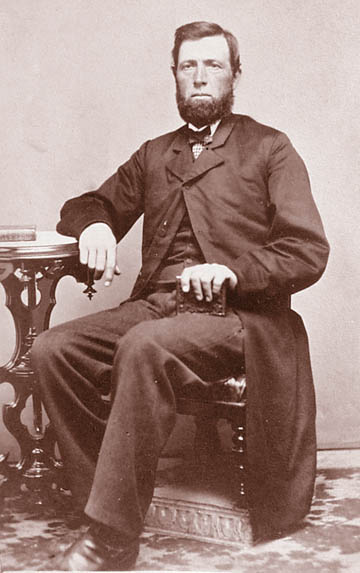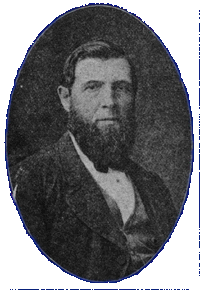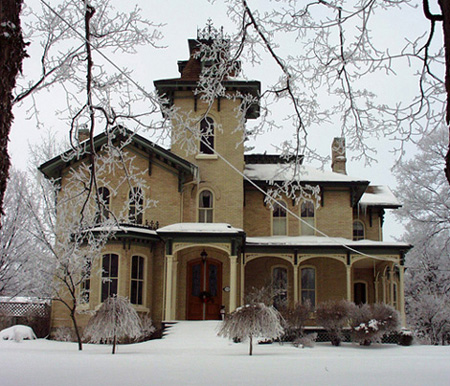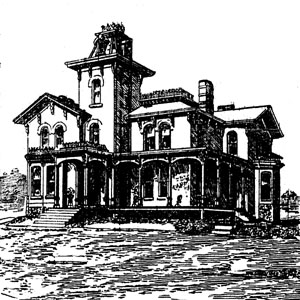The Coming Of The Railway
By Samuel Farmer
On The Shores of Scugog
Those early times were palmy days for Prince Albert;
but changes were coming. There were now three rival villages in Reach -
Prince Albert, Port Perry and Manchester. Each place had its strong men
who studied and fought to secure advantages for their respective
villages. In Manchester there was Adam Gordon a man of quiet
determination, who had considerable influence,
as he at one time represented the riding in Parliament. At Prince
Albert,
Joshua Wright was the champion at first, but later he transferred his
allegiance
to Port Perry. He was a great fighter, fond of a debate, and often able
to
carry his point by sheer force of personality. There are many unwritten
stories
told of the prowess of Joshua Wright in debate. In Port Perry Messrs.
Bigelow
and Paxton were the men who looked after the municipal interests. These
men
stood out prominently as champions for their various villages.
Up to 1867 all the grain and lumber that had been taken to
the front had been teamed there. There was no railway along this route.
Often there had been talk of one, but no definite effort had been made
for its construction.
Had it not been for the rivalry of the villages; it is quite possible
that
the railway would not have been built until some years later. But
Prince
Albert was quite sure that Prince Albert would have to take a second
place
before many years.
Thinking men knew that none of these places could amount
to much until there was railway communication with the Front. The old
days were passing and new conditions had to be met.
In 1867 application was made to the Local Legislature for
a charter to build a railway from Port Whitby to Port Perry. Messrs.
Joseph Bigelow and Thomas paxton were the men who started the project.
Associated with them and forming the Provisional Board of Directors
were the following gentlemen: W.S. Sexton, Chester Draper, John Ham
Perry, James Holden and Sheriff
Reynolds.
After the charter was secured, meetings were held in
Whitby Town, Whitby Township, and Reach Township to secure bonuses from
these various municipalities. In this manner $100,000 were raised,
divided as follows - Whitby Town $50,000; Whitby Township $20,000;
Reach Township $30,000. Stock was subscribed to the amount of $100,000;
and with this capital the work of
construction was begun. During this time and until the completion of
the railway,
Joseph Bigelow was president of the company.
The contract for building the road was let to J. H. Drumble, of
Cobourg, who worked at the job for a while and then sold out to C. E.
English, of Toronto.
This latter gentleman did not complete the work, but a dispute arose
between
himself and the company,and the result was that the company finished
the
building of the road themselves.
In deciding the route of the railway, many conflicting
interests had to be studied. Reach Township had voted a bonus of
$30,000 but the voters were not all agreed as to the route of the
proposed railway. Adam Gordon and
his friends wanted the road to pass through Manchester. Joshua Wright
and
his friends worked to get the railway to pass by the tannery a little
West
of Prince Albert. Had either of these routes been followed there would
have
been endless trouble, because Prince Albert and Manchester were rival
grain
buying centres, and the railway would have meant business success to
the
place that secured it, and failure to the other place. What finally
resulted was that neither place secured the advantage. Stations were
built south of Manchester and east of Prince Albert; but the terminus
of the railway was at Port Perry. As things turned out the terminus was
much more valuable than the stations. Grain which before had been
marketed in Prince Albert and Manchester from the north was hauled to
Port Perry after the railway was completed, and
Aaron Ross moved his grain buying business from the former to the
latter place.
That year he built the elevator at present operated by James Lucas.
Adam
Gordon, of Manchester, also put up a big elevator, which was later
destroyed by fire.
It was not all plain sailing in building the road. There
was the usual difficulty in raising money, and after a while funds
became low.
Joseph Bigelow had money which he was willing to
lend to the company, but so long as he was president of that
organization, he could not legally do this. Accordingly he resigned his
position, and loaned the company $40,000. James Dryden became
president.
In 1873 the company sold out. The following extract from
the Port Perry Standard, dated May 23, 1873, gives details as to the
transaction:
"T. Paxton,
Jos. Bigelow, C.E. English and J.
Dryden, Esqs., have disposed of their interest in the Port Whitby and
Port Perry Railway
by a transfer of seventy thousand dollars of the stock, and some
eighty-three
thousand dollars of the bonds of the Company to James Austin, President
of
the Dominion Bank, James Michie, wholesale merchant of Toronto, and
James
Holden, of the Town of Whitby. Mr. Dryden, the late President, and Mr.
C.
Marsh have retired from the board, and have been succeeded by James
Austin
as President, James Michie as Vice-President, and James Holden as
Managing
Director.
"We understand that the gentlemen associated with Mr.
Holden in the purchase are among the wealthiest capitalists of Toronto.
With the exception of the changes referred to, the personnel of the
Board is the same as heretofore - Messrs. C. Draper, A. Ross, E. Major
and John Dryden being the Directors. We hope the new blood and capital
that has been brought into the concern will be of advantage to all
concerned, and to the interests of the public generally.
"If the men who now control will do what they promise, in
the way of fully equipping the road with rolling stock, which is at
present insufficient to meet the demands for traffic, and the road is
otherwise put into first-class condition, we shall not regret the
change. In referring to the condition of
the roadbed, we may say that there is no better in the Province; and in
condition
to run over it is superior to the Grand Trunk. With a change of gauge
of
that road, which we would be glad to see, trains could run from Port
Perry
to Toronto without change or transshipment at Whitby. With proper
management
in the Company's interest, this will be one of best paying roads in the
country.

"In reference to the parties who have had control
in the past, we can assuredly say that notwithstanding all the
obstacles that have been thrown in their way to embarrass and annoy
them in the completion of the road, they succeeded and carried it to
its present state, and have established a large and paying traffic. For
so doing no men have been so vindictively,
persistently and wantonly abused and misrepresented as
Mr. Bigelow,
Mr. Paxton and Mr. Dryden, and all through their honest endeavors to
secure
the completion of a railway to this section of the country.
"Knowing well the importance of the work to the country
and the country generally, Mr. Bigelow and Mr. Paxton have been the
moving spirits in this enterprise from its first inception, and they
deserve credit for their
determined and persistent efforts in its behalf; and, without fear of
successful
contradiction, we affirm that the county is more largely indebted to
these
gentlemen for the completion of the road than all the other parties
connected
with it.
"These gentlemen have been charged with desiring to stop
the road at Port Perry in order to serve the interests of Port Perry
alone, regardless of the Town of Whitby and other sections of the
county, but such statements are by no means true. They were made with a
special object in view - that of hurting the credit of those they were
aimed at, and to injure the prosperity of this place. These gentlemen
have only been actuated by one motive, and that simply the completion
of the road. They were willing to hand over the road, or their
interests in it, and did so, as soon as a bona fide proposition was
made to them, by which they could obtain re-payment of their large
advances. It was hardly to be expected that while
Mr. Bigelow
held so large an
interest in the Company, both as a stockholder and a creditor, that he
and
the gentlemen with whom he was associated, would give up control and
allow
a ring of manipulators to endanger his interests, and those of his
friends,
without due consideration to security. When those desirous of managing
the
affairs of the company found this was the case, a combination was
formed for
purchasing the interests of the gentlemen to whom we have referred.
"The advance made by Mr. Bigelow amounted to $49,110, of
which he received $42,000 in legal tender from the Bank of Montreal on
Monday, a
nice little sum in hard cash. We hope the croakers will now end their
abuse, as these gentlemen have shown by their willingness to retire,
what we have always contended for, that it was not the control they
wanted, but that they were actuated wholly and solely by the desire,
first to secure the road and then to secure themselves, and we don't
blame them for it."
In spite of the continuous efforts of the Directorate to
make the railway a profitable project, and in spite of the optimistic
spirit of the press of that day, profits were small if they existed at
all.
It was plain that profits could not be attained so long as
the railway was a stub line having no direct connection with any of the
larger railways. When a passenger wished to travel to Toronto, he did
not buy a ticket
straight through to his destination, but paid his passage to Whitby,
where
he bought another ticket to Toronto. In the same way freight was
shipped to
Whitby and then transshipped to Toronto and other points. Various
efforts were made to dispose of the road to some of the larger
companies, but without success.
Finally it was thought advisable to extend the road to
Lindsay, so that its earnings could be increased. Another campaign for
bonuses was begun, the money raised, and the road extended.
1912 Railroad Port Perry
Since the time of extension there have been various
views of the advisability of this movement. It is certain that Port
Perry
lost considerable trade eventually; and some have considered that the
bonus
of $20,000 given by Port Perry for the extension of the road was worse
than wasted. In fact most people agree that the amount of the bonus was
too large.
Those who advocated the extension claimed that eventually
the road must have failed had it not been extended. There was not
enough business to warrant the upkeep of the railway, and the
probability was that trade would
decrease instead of increase, as the lumber was gradually being cut
away.
In any case larger railways would not buy the railway as it stood.
After
the railway was extended, close watch was kept on the earnings of the
road
until the company was able to show a margin of profit. Then it was that
the
Midland Railway bought the road,and it finally became a branch of the
G.T.R.
The early locomotives used wood for fuel, and along the
east side of the track were immense piles of cordwood. At that time the
engines on the Grand Trunk also burned wood; but it was plentiful all
along the track, so that no difficulty was experienced in obtaining
fuel.
The rolling stock was rented from a man in Montreal,
except in the case of the passenger car which was bought in the United
States.

 .
.







